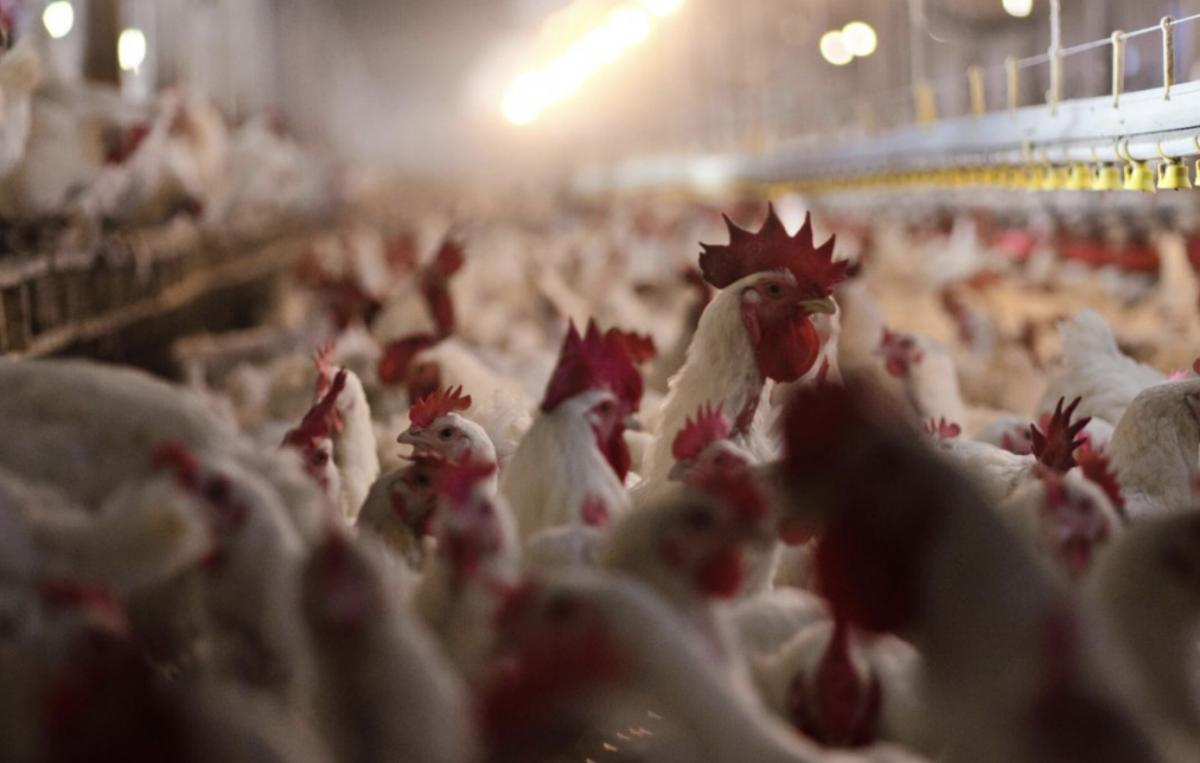Eighty-four percent of poultry farms in Maryland failed their first state inspection over the last several years, most due to inadequate waste management and failure to keep records — but the state rarely penalized poultry farms for their violations, according to a recent report by an environmental watchdog organization.
Out of 182 poultry farms that were inspected, 153 failed their initial inspection and 78 failed follow-up inspections from 2017 to 2020. Two thirds of the inspected poultry farms failed due to waste management problems and 95% failed to file annual reports to the state or maintain records about their operations, the report by the Environmental Integrity Project on Maryland’s poultry industry found.
Despite the failed inspections, the report found that the Maryland Department of the Environment, which is responsible for issuing water pollution control permits for animal feeding operations and for enforcing the federal Clean Water Act, imposed fines on only eight of the 78 facilities with repeated violations, and collected fines from only four poultry farms.
Jay Apperson, a spokesman for MDE, said he could not comment on the report’s findings because MDE has not seen it. But, he said, “The Maryland Department of the Environment, in coordination with the Maryland Department of Agriculture, maintains a strong program to enforce environmental regulations pertaining to poultry operations. A high percentage of violations that are found are associated with record-keeping requirements, as opposed to water quality issues. Where we do find environmental concerns we focus on returning facilities to compliance with regulations, but we will go after polluters and impose financial penalties when needed.”
The Environmental Integrity Project report is based on public records obtained from MDE and MDA from Maryland’s Public Information Act law. For the last nine months, EIP reviewed more than 5,000 pages of poultry operation inspection reports and other state records to evaluate how much oversight there is of the state’s poultry operations.
The state has limits on how much manure farmers can apply to fields that already have high soil phosphorus levels. Adding manure to fields can help provide nutrients for crops, especially when soils are low in phosphorus. However, excessive phosphorus on fields can get into waterways after storms, which risks algal blooms and sucks up the oxygen needed by fish.
According to the Chesapeake Bay Foundation, agriculture runoff is the largest source of pollution into the Chesapeake Bay, contributing to 40% of the nitrogen and 50% of phosphorus in the Bay.
Twenty-nine of 57 poultry farms that EIP reviewed reported to the state that they had been applying illegal amounts of animal manure on their crop fields in 2019. Most farms are required to have nutrient management plans when fertilizing crops and managing animal manure in order to prevent excess nutrients going into waterways, and the Maryland Department of Agriculture is responsible for enforcing these plans.
But MDA has not issued any fines on poultry farms for spreading excess poultry manure, according to Jason Schellhardt, the spokesman for the agency.
Currently, there are 553 permitted poultry concentrated animal feeding operations (CAFOs) and Maryland animal feeding operations (MAFOs) in Maryland, according to Apperson. In 2019, Caroline County had 108 poultry farms that produced almost 50 million birds, the highest number in any county, according to the report. Dorchester County had 45 poultry farms in 2019, which yielded 28 million birds.
The report also found that 174 poultry operations on the Eastern Shore are within 400 feet of a house, which increases residents’ exposure to ammonia, dust and manure particles. Only 64 of these poultry farms had vegetated buffers such as a row of trees between the poultry house and residents’ homes, which is a way to divert emissions, the report said.
In 2016, Wicomico County residents formed Concerned Citizens Against Industrial CAFOs to oppose construction of what was going to be the largest poultry operation in the state near Salisbury, citing health concerns from air pollution and manure that could pollute drinking water sources. Two years later, the chicken farm operators canceled their plans.
During the 2020 legislative session, Del. Vaughn Stewart (D-Montgomery) introduced a bill that would have blocked the expansion of industrial poultry operations in the state by precluding MDE from issuing stormwater permits for any animal feeding operations producing more than 300,000 chickens annually. However, the bill never made it out of committee.
MDE has just three employees who perform in-person inspections at poultry farms and MDA has nine employees who oversee nutrient management plans of over 5,000 farms across the state. The report found that the number of poultry farms inspected by MDE fell by 40% since 2013.
To improve poultry farms’ compliance with the federal Clean Water Act and state laws, EIP recommends that MDE and MDA impose more penalties against poultry farms in violation with their nutrient management plans and water permits. The report also recommends that the state hire more inspectors, increase water and air monitoring near poultry farms and enforce the state’s new manure application rules for farms.
“MDA is failing to provide any reality-based ground-truthing or accountability for the largest single source of pollution in the Bay, the agricultural industry,” the report states. EIP also described state oversight over poultry operations as “an empty paperwork exercise that falls well short of what is needed to control agricultural runoff pollution or protect the Chesapeake Bay.”
By Elizabeth Shwe


